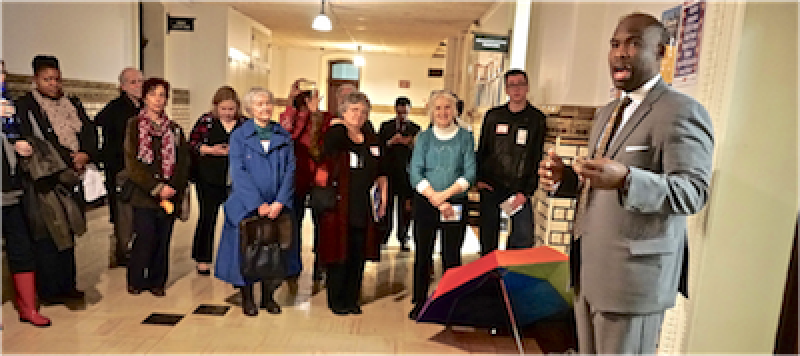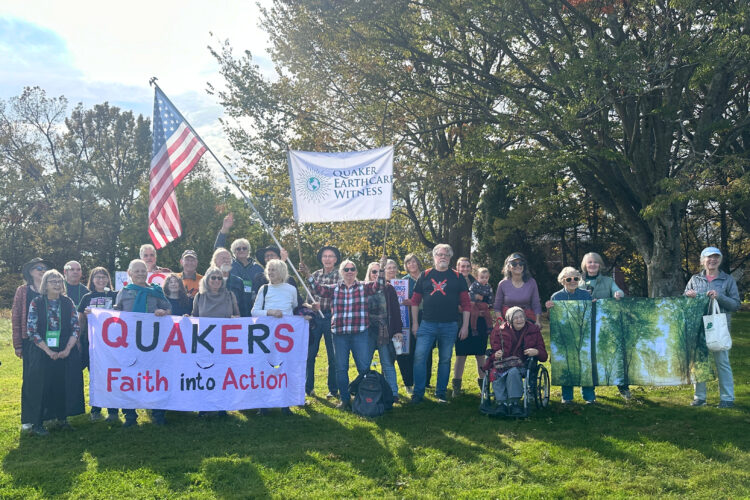Public Banking, Divine Vocations, and Fertile Ground

By Pamela Haines.
THE ECO-JUSTICE Collaborative (EJC) of Philadelphia Yearly Meeting has endorsed an effort in Philadelphia to create a public bank. Similar to credit unions for individuals, a public bank would hold public funds in the city to be directed toward local needs, rather than paying for big banks to manage those funds and invest them wherever the profits are highest. Rita Varley and I, both members of EJC and Central Philadelphia Monthly Meeting, have had a couple of very rich experiences this spring sharing the message of public banking.
At the Philadelphia Urban Coalition, a group of mostly Black church leaders convened by former mayor Wilson Goode, we offered an explicitly religious frame on the issue. According to theologian Walter Wink, the Spirit is at the core of every institution (or Power), but their spirituality can become diseased. The task of the church, he says, is to identify these Powers, discern whether they are still aligned with serving the common good, and if not, redeem them by calling them back to their original “divine vocation.” Urban Coalition members resonated strongly with the message that it is not rightly ordered for big banks to use our public money to maximize their profits, when great needs in the city are unmet for lack of financial resources. They were ready and eager to use their networks and organizing capacity to gather support for a public banking alternative.
Rita and I were also part of a lobby day effort with City Council, where one Councilperson has taken the lead—finding money for a study on how a public bank might be created and operated, and working with the Commerce Department to identify a group to do such a study. After a morning briefing, our group of forty or so fanned out through City Hall to meet with each Councilperson or a member of their staff. I was particularly touched by one staffer’s response. He had never heard of this concept, and it was a case of love at first sight. “This would be really good for the little people.” “We could save a lot of money.” (Philadelphia paid $170 million in debt service last year.) “I think my Councilwoman is really going to like this.”
It was also a pleasure to lead a team of Philadelphians who were new to the issue but ready to make a move. (The interfaith organizing group, POWER, had just endorsed the idea of a public bank, and several folks came on the strength of that connection.) We talked in advance about what each person in our group could say about an aspect of public banking that spoke strongly to them. I learned later that two of them had not intended to stay for the Council visits because they felt that they didn’t know enough, but with my reassurance that I would answer the “expert” questions they were ready to do their best, and together we made a great team.
It was helpful to be able to refer to the Bank of North Dakota, a public bank that has operated successfully for 100 years, kept state infrastructure project costs low, returned interest to the Treasury, supported community banks, and helped the state sail through the recession of 2008, since none of their money was in Wall Street.
In a recent Freedom Seder in Philadelphia, Reverend William Barber of the Poor People’s Campaign invoked Jeremiah, who called on God’s messengers to go to the seat of power and challenge the abuse of that power. When we went to City Hall, it was clear that this abuse of financial power was not happening there. As Philadelphia citizens and public officials together work toward a public bank in Philadelphia, we will be challenging the abuse of power of the big banks. We will be calling our financial institutions back to their divine vocation of serving the community by holding, dispersing and investing our money for the common good.
Pamela is a member of Friends Economic Integrity Project and a member of Central Philadelphia (PA) Meeting.
Image: Councilman Derek Green (right),a public banking advocate, addresses local lobbyists at Philadelphia City Hall on Lobby Day (Rita in blue and Pamela in teal). Photo: Stanley Shapiro.

